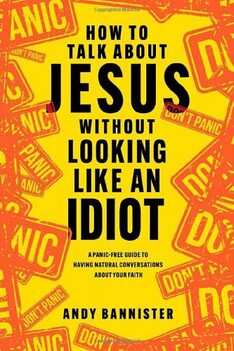andy bannister
Andy Bannister is Canadian Director for RZIM, speaking and teaching regularly throughout Canada, the USA, Europe and the wider world. From churches to universities, business forums to TV and radio, he regularly addresses audiences of both Christians and those of all faiths and none on issues relating to faith, culture, politics and society. Bannister holds a PhD in Islamic studies and have taught extensively at universities across Canada, the USA, the UK and further afield on both Islam and philosophy. He is also an Adjunct Research Fellow at the Centre for the Study of Islam and Other Faiths at Melbourne School of Theology. He is the author of An Oral-Formulaic Study of the Qur’an (a groundbreaking and innovative study that reveals many of the ways the Qur’an was first composed) and Heroes: Five Lessons From Whose Lives We Can Learn, an exciting and fast-moving look at the lives of five incredible giants of the Christian faith. My latest book, The Atheist Who Didn’t Exist (or: The Dreadful Consequences of Really Bad Arguments), is due to be published in summer 2015. He also co-wrote and presented the TV documentary, Burning Questions.
5.15.24: Andy Bannister: Premier Christianity: Church of England cowardice is hindering our evangelism
 Andy Bannister
Andy Bannister
If atheism were true, and we live in a godless universe, then we are living in a tragedy. No matter how high humanity may climb, everything ends in ruin eventually. But if Christianity were true, then no matter how dark things may look, we know that this is not the story’s end; that, ultimately, evil will be defeated and, after the last tear has fallen, there is love.
--Andy Bannister; Premier Magzine; Why your favourite stories are full of Christian meaning; Nov 29, 2023
--Andy Bannister; Premier Magzine; Why your favourite stories are full of Christian meaning; Nov 29, 2023
From Islam to Atheism to Christianity - the unlikely conversion of Ayaan Hirsi Ali
I was reminded of C.S. Lewis’s unconventional and circuitous road to faith when I read with shock the recent announcement that Ayaan Hirsi Ali has become a Christian. Ali is a public intellectual, author and women’s right’s activist, but is also famous as a fiery atheist, former Muslim and later fierce critic of Islam, her criticism driven by the hatred and violence she had seen both in her first-hand experiences as well in as Islam’s core texts, as detailed in her book, Infidel. (Andy Bannister/Premier Christianity 11/17/23)
READ MORE>>>>>
I was reminded of C.S. Lewis’s unconventional and circuitous road to faith when I read with shock the recent announcement that Ayaan Hirsi Ali has become a Christian. Ali is a public intellectual, author and women’s right’s activist, but is also famous as a fiery atheist, former Muslim and later fierce critic of Islam, her criticism driven by the hatred and violence she had seen both in her first-hand experiences as well in as Islam’s core texts, as detailed in her book, Infidel. (Andy Bannister/Premier Christianity 11/17/23)
READ MORE>>>>>

Andy Bannister – How to Talk About Jesus Without Looking like an Idiot
A panic-free guide to having natural conversations about Jesus 8/9/23
You have to feel sorry for Andy Bannister’s children! He is possibly the teller of the worst dad jokes in human history. I am surprised that there isn’t a hazard warning notice on the cover of this book. The cover has the sign: Don’t Panic; perhaps it should say Don’t Laugh, you might encourage him! No seriously, the jokes aside this is a helpful and readable guide to how to speak to people about Jesus.
First, the book deals with the confidence issue. The author deals with a range of common things that make us too afraid to speak about our faith, and using his own story he shows how those fears can be overcome.
Second, the book shows how Jesus models asking questions. This section helpfully shows how we can be too quick to get to the answer, with people being unaware of the need for one.
The four questions he suggests are: What? Why? Wondering? Whether?
He offers the following four examples:
What do you mean by the word god?
Why do you think that all religions lead to god?
Have you ever wondered why we are so drawn to art and beauty?
I wonder whether Christianity makes better sense of human rights and dignity than the alternatives?
Third, the offers advice on how to deal with questions. Here he uses the five steps SHARE:
Sympathise with the person asking the question.
Highlight hidden assumptions made by the questioner.
Apply the Bible to the question.
Retell the gospel to point the questioner to Jesus.
(This section also reinforces what the author has said about connecting the question to what Jesus said, did or a story he told.)
Equip your friend by pointing them to appropriate resources for further exploration.
Most readers would benefit from reading a book like this. It does open up the possibilities of gospel witness and provides some useful tools for engaging in it.
Many books on evangelism suffer from the gift projection of the author and the sense that the evangelistic formula provided is more straightforward in theory than in practice.
Andy Bannister seeks to avoid gift projection, yet I think some people might still be intimidated by this book. While it does avoid merely offering a guaranteed formula, readers might yet ask: why is that the actual non-Christians we talk to seem so much less compliant than those in the books on evangelism?!
This might not be the last word on evangelism for the timid, but it is a good start. Keep calm and read Andy!
John Woods is a writer and Bible teacher based in West Sussex. He is Director of Training at the School of Preachers in Riga, Latvia.
A panic-free guide to having natural conversations about Jesus 8/9/23
You have to feel sorry for Andy Bannister’s children! He is possibly the teller of the worst dad jokes in human history. I am surprised that there isn’t a hazard warning notice on the cover of this book. The cover has the sign: Don’t Panic; perhaps it should say Don’t Laugh, you might encourage him! No seriously, the jokes aside this is a helpful and readable guide to how to speak to people about Jesus.
First, the book deals with the confidence issue. The author deals with a range of common things that make us too afraid to speak about our faith, and using his own story he shows how those fears can be overcome.
Second, the book shows how Jesus models asking questions. This section helpfully shows how we can be too quick to get to the answer, with people being unaware of the need for one.
The four questions he suggests are: What? Why? Wondering? Whether?
He offers the following four examples:
What do you mean by the word god?
Why do you think that all religions lead to god?
Have you ever wondered why we are so drawn to art and beauty?
I wonder whether Christianity makes better sense of human rights and dignity than the alternatives?
Third, the offers advice on how to deal with questions. Here he uses the five steps SHARE:
Sympathise with the person asking the question.
Highlight hidden assumptions made by the questioner.
Apply the Bible to the question.
Retell the gospel to point the questioner to Jesus.
(This section also reinforces what the author has said about connecting the question to what Jesus said, did or a story he told.)
Equip your friend by pointing them to appropriate resources for further exploration.
Most readers would benefit from reading a book like this. It does open up the possibilities of gospel witness and provides some useful tools for engaging in it.
Many books on evangelism suffer from the gift projection of the author and the sense that the evangelistic formula provided is more straightforward in theory than in practice.
Andy Bannister seeks to avoid gift projection, yet I think some people might still be intimidated by this book. While it does avoid merely offering a guaranteed formula, readers might yet ask: why is that the actual non-Christians we talk to seem so much less compliant than those in the books on evangelism?!
This might not be the last word on evangelism for the timid, but it is a good start. Keep calm and read Andy!
John Woods is a writer and Bible teacher based in West Sussex. He is Director of Training at the School of Preachers in Riga, Latvia.
April 12, 2023: Andy Bannister: Baptist News Global: A toolbox for evangelism
 Andy Bannister Files
Andy Bannister Files
In Colossians 4, the Apostle Paul wrote these well-known words, encouraging the Christians in Colossae to think about how to reach their friends, neighbors, and community with the gospel: “Devote yourselves to prayer, being watchful and thankful. And pray for us, too, that God may open a door for our message, so that we may proclaim the mystery of Christ, for which I am in chains. Pray that I may proclaim it clearly, as I should. Be wise in the way you act towards outsiders; make the most of every opportunity.”
I am struck by the way in this short paragraph Paul so clearly connects three things essential for evangelism: Prayer, opportunity and initiative. Begin with prayer, be devoted in prayer — pray, pray and pray some more. Then in answer to those prayers, look for opportunities to proclaim the gospel and do so clearly. And as you do that, take the initiative and make the most of every one of those opportunities. Having some good questions in your evangelistic toolbox will help you tremendously with that last step. --Andy Bannister; April 2023
I am struck by the way in this short paragraph Paul so clearly connects three things essential for evangelism: Prayer, opportunity and initiative. Begin with prayer, be devoted in prayer — pray, pray and pray some more. Then in answer to those prayers, look for opportunities to proclaim the gospel and do so clearly. And as you do that, take the initiative and make the most of every one of those opportunities. Having some good questions in your evangelistic toolbox will help you tremendously with that last step. --Andy Bannister; April 2023
Mar 22, 2022: The Scotsman: Aim for the top of the ladder in the pursuit of happiness - Dr Andy Bannister
July 9, 2021: Cross Examined: Book review of “The Atheist Who Didn’t Exist”: more bad atheist arguments?
The Atheist Who Didn’t Exist (2015) by Andy Bannister promises to critique a number of atheist arguments. The subtitle is, “The dreadful consequences of bad arguments.” I’m on board with bad arguments having bad consequences, so I’m curious to hear what I’m guilty of.
The Atheist Who Didn’t Exist (2015) by Andy Bannister promises to critique a number of atheist arguments. The subtitle is, “The dreadful consequences of bad arguments.” I’m on board with bad arguments having bad consequences, so I’m curious to hear what I’m guilty of.
April 13, 2020: Friendly Athiest: Christian Accidentally Tells Newspaper That Faith in God is Like Faith in Santa
Uh-oh. Wait till fellow believers like Andy Bannister hear about this. Bannister, the director of the Solas Centre for Public Christianity, wrote a piece a few years ago about how tired he is of “smug atheists” likening his totally real God to the fictional Kris Kringle.
Uh-oh. Wait till fellow believers like Andy Bannister hear about this. Bannister, the director of the Solas Centre for Public Christianity, wrote a piece a few years ago about how tired he is of “smug atheists” likening his totally real God to the fictional Kris Kringle.
July 29, 2016: Stand To Reason: Yes, Christians Are Hypocrites—If by “Hypocrite” You Mean “Sinner”
Andy Bannister explains that, contrary to Christopher Hitchens’s claim, religion isn’t what poisons everything. The problem is much deeper, more pervasive, and far more personal.
Andy Bannister explains that, contrary to Christopher Hitchens’s claim, religion isn’t what poisons everything. The problem is much deeper, more pervasive, and far more personal.
Aug 30, 2015: Wintery Knight: Andy Bannister and Michael Ruse discuss how atheists find meaning in life
Atheist philosopher Michael Ruse joins Justin as we spend a second week looking at Andy Bannister’s new book ‘The atheist who didn’t exist’.
Atheist philosopher Michael Ruse joins Justin as we spend a second week looking at Andy Bannister’s new book ‘The atheist who didn’t exist’.
